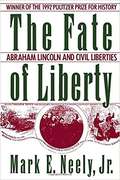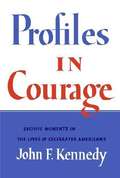- Table View
- List View
Preventing War: The United Nations and Macedonia
by Abiodun WilliamsDescribes the role the UN played in Macedonia.
How Democratic Is the American Constitution?
by Robert A. DahlDahl starts with the assumption that the legitimacy of the American Constitution derives solely from its utility as an instrument of democratic governance. Dahl demonstrates that, due to the context in which it was conceived, our Constitution came to incorporate significant antidemocratic elements. Because the Framers of the Constitution had no relevant example of a democratic political system on which to model the American government, many defining aspects of our political system were implemented as a result of short-sightedness or last-minute compromise.
Blood, Class and Nostalgia: Anglo-American Ironies
by Christopher HitchensAmerica's "special relationship" with Britain goes largely unexamined. The author shows that the "special" ingredient in the relationship is a compound of empire, transmitted from an ancient regime that has tried to preserve and renew itself thereby.
Atlantic High: A Celebration
by William F. Buckley Jr.William F. Buckley Jr.'s account of his voyage across the Atlantic Ocean in the sailboat Sealestial, Atlantic High is a work that everywhere evidences Buckley's love for sailing and good companionship. Infused with his inimitable wit and supported by a rich fund of anecdotes and observations, Atlantic High is truly a one-of-a-kind work.
The Decline of Bismarck’s European Order: Franco-Russian Relations, 1875-1890
by George F. KennanThe Franco-Russian alliance evolved more and more steadily into a long-term military alliance, an instrument of foreign policy that Kennan deplored as too rigid and unresponsive to a changing international situation.
Elizabeth I: A Study in Power and Intellect
by Paul JohnsonWell written with scholarly references. Style will appeal to the historian and less scholarly readers.
The Fate of Liberty: Abraham Lincoln and Civil Liberties
by Mark E. NeelyOne of America's leading authorities on Lincoln wades straight into this controversy, showing just who was jailed and why, even as he explores the whole range of Lincoln's constitutional policies.<P><P> Pulitzer Prize Winner
Profiles in Courage
by John Fitzgerald Kennedy"This is a book about that most admirable of human virtues--courage... and these are the stories of the pressures experienced by eight United States Senators and the grace with which they endured them--the risks to their careers, the unpopularity of their courses, the defamation of their characters, and sometimes, but sadly only sometimes, the vindication of their reputations and their principles." <P><P> During 1954-1955, John F. Kennedy, then a U.S. Senator, chose eight of his historical colleagues to profile for their acts of astounding integrity in the face of overwhelming opposition. These heroes include John Quincy Adams, Daniel Webster, Thomas Hart Benton, and Robert A. Taft. <P><P> Awarded the Pulitzer Prize in 1957, Profiles in Courage resounds with timeless lessons on the most cherished of virtues and is a powerful reminder of the strength of the human spirit.
In the Name of Osama Bin Laden Global Terrorism and the Bin Laden Brotherhood
by Roland JacquardOne view of the Bin Laden Brotherhood.
The Shield of Achilles: War, Peace, and the Course of History
by Philip BobbittHistory of war and international relations with commentary and theses.
Soul on Ice
by Eldridge CleaverThe now-classic memoir that shocked, outraged, and ultimately changed the way America looked at the civil rights movement and the black experience. By turns shocking and lyrical, unblinking and raw, the searingly honest memoirs of Eldridge Cleaver are a testament to his unique place in American history. Cleaver writes in Soul on Ice, "I'm perfectly aware that I'm in prison, that I'm a Negro, that I've been a rapist, and that I have a Higher Uneducation." What Cleaver shows us, on the pages of this now classic autobiography, is how much he was a man.
Empty Breadbasket? The Coming Challenge to America's Food Supply and What We Can Do About It
by The Cornucopia Project of Rodale PressThe massive U.S. food supply which provides us with almost any food we want-at any time of year-is surprisingly fragile. Without a change in directions there will be a depletion of natural resources: soil, water, energy. This book is a result of the study conducted by the Cornucopia Project of Rodale Press to document the vulnerability, and suggest how consumers, farmers and food industry can improve.
The Best Democracy Money Can Buy
by Greg PalastA disturbing book about manipulation by the rich of the have-nots.
American Government in Christian Perspective Third edition
by William R. Bowen George T. Thompson Michael R. Lowman George C. CochranChristian textbook
My Ten Years as a Counterspy
by Boris Morros Charles SamuelsBoris Morros was a successful Hollywood producer and a highly regarded musician and impresario. His life had been a legendary success story even in the flamboyant annals of show business. What chain of events in 1936 led him into serving the interests of a Soviet spy ring? What even more dramatic events brought him into the office of the FBI in 1947 to take on the role of a United States counterspy? How did Morros manage to deceive Communist agents and help provide the evidence which resulted, in the exposure and conviction of the, leaders of the spy ring? This book, for the first time, unfolds the entire drama of the ten-year ordeal of Boris Morros.
My Life
by Golda Meir"My Life" by Golda Meir is a compelling autobiography of an amazing woman, from her early days in poverty-stricken Kiev to her tenure as Prime Minister of Israel. This is a frank portrayal of her personality, motivations and goals.
America, Inc.: Who Owns and Operates the United States
by Jerry S. Cohen Morton Mintz"This well-documented expose' reveals the incorporated rulers of the United States and, indeed, much of the world. It shows them to be private governments which, as effectively as legitimate public governments, decide whether large numbers of us live or die. They levy taxes in the form of price increases, unrestrained by competition. They manipulate legitimate governments, turning nations into welfare states for corporations. And they are generally only responsible to themselves. Thus the citizen is powerless while the conglomerates enforce private socialism and decry public socialism. The authors propose an alternate solution to this seemingly powerless situation."
The Emperor's Winding Sheet
by Jill Paton WalshFamished, terrified, exhausted, a boy drops from the tree in which he has hidden just as Constantine, last Emperor of the Romans, is about to receive his crown in a monastery garden. By this accident, Piers Barber, a shipwrecked young seaman from Bristol, England, now renamed Vrethiki ("lucky find"), becomes an unwilling talisman to the Emperor, for it has been prophesied that if there is even one person who is at his side when he takes the crown, stays with him always, the City will not perish. This is the story of the fall of Constantinople in 1453 and of the siege that marked the end of the proud, ancient Byzantine Empire. Corrupt, driven by bigotries, jealousies, and natural vanities, the City nevertheless commanded such bravery and loyalty as the world has seldom seen. Through the darkening months, Vrethiki is brought out of his sullen despair as he lives in the midst of a heroism and treachery, dogged endurance and blazing faith. And in time he comes to see the City as a vision worth dying for and the Emperor as his own true lord.
Out Of The Closet Into Our Hearts: Celebrating Our Gay/Lesbian Family Members
by Laura Siegel Nancy Lamkin OlsonGay Cuban Nation
by Emilio BejelWith Gay Cuban Nation, Emilio Bejel looks at Cuba's markedly homoerotic culture through writings about homosexuality, placing them in the social and political contexts that led up to the Cuban Revolution. By reading against the grain of a wide variety of novels, short stories, autobiographies, newspaper articles, and films, Bejel maps out a fascinating argument about the way in which different attitudes toward power and nationalism struggle for an authoritative stance on homosexual issues. Through close readings of writers such as José Martí, Alfonso Hernández-Catá, Carlos Montenegro, José Lezama Lima, Leonardo Padura Fuentes, and Reinaldo Arenas, whose heartbreaking autobiography, Before Night Falls, has enjoyed renewed popularity, Gay Cuban Nation shows that the category of homosexuality is always lurking, ghostlike, in the shadows of nationalist discourse. The book stakes out Cuba's sexual battlefield, and will challenge the homophobia of both Castro's revolutionaries and Cuban exiles in the States.


